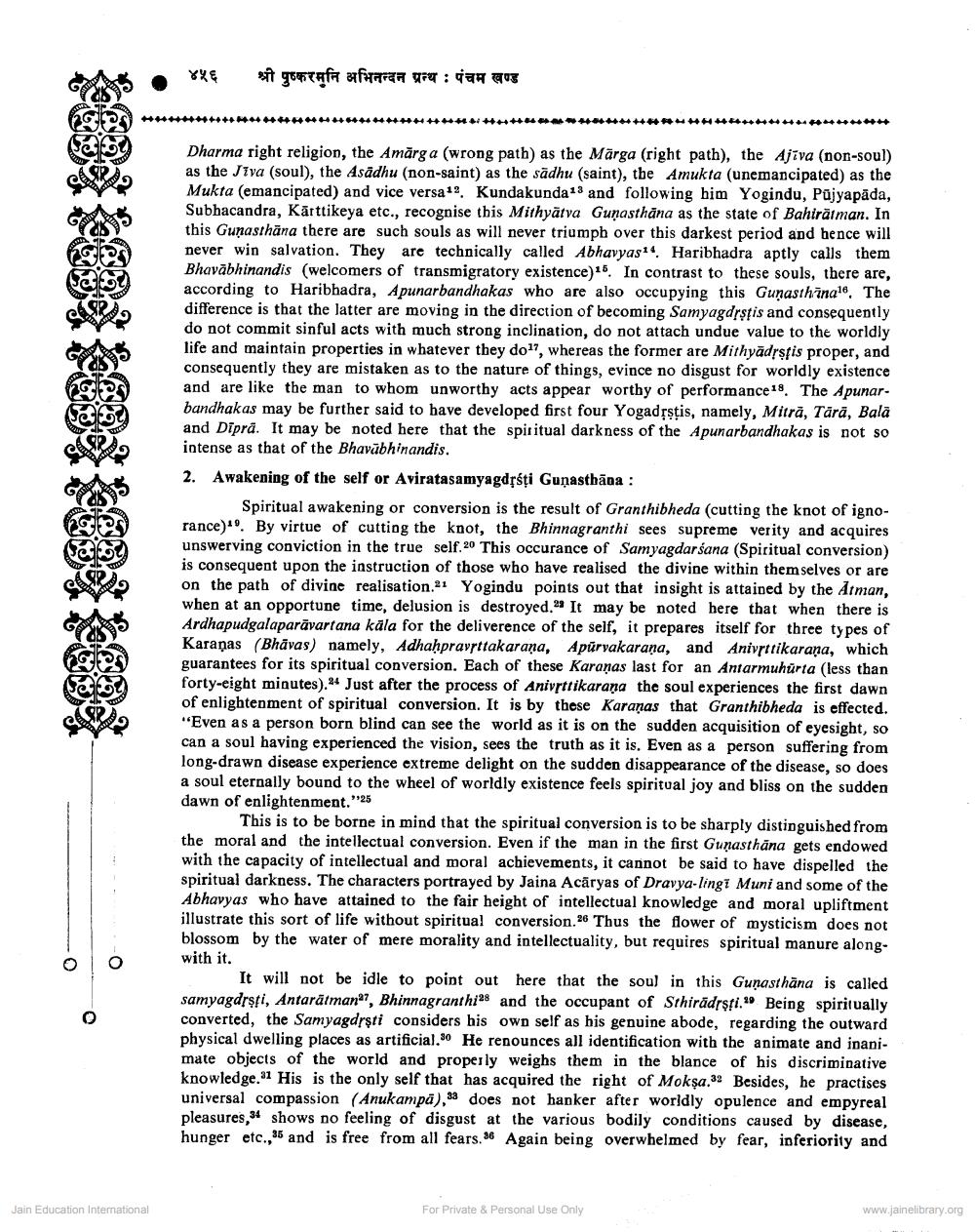Book Title: Jaina Mysticism Author(s): Kamalchand Sogani Publisher: Z_Pushkarmuni_Abhinandan_Granth_012012.pdf View full book textPage 3
________________ ४५६ श्री पुष्करमुनि अभिनन्दन प्रन्थ : पंचम खण्ड Dharma right religion, the Amārga (wrong path) as the Mārga (right path), the Ajīva (non-soul) as the Jiva (soul), the Asädhu (non-saint) as the sādhu (saint), the Amukta (unemancipated) as the Mukta (emancipated) and vice versa 12. Kundakunda 13 and following him Yogindu, Pujyapāda, Subhacandra, Kārttikeya etc., recognise this Mithyātva Gunasthāna as the state of Bahiräiman. In this Gunasthäna there are such souls as will never triumph over this darkest period and hence will never win salvation. They are technically called Abhavyas Haribhadra aptly calls them Bhavabhinandis (welcomers of transmigratory existence) 15. In contrast to these souls, there are, according to Haribhadra, A punarbandhakas who are also occupying this Gunasthinae. The difference is that the latter are moving in the direction of becoming Samyagdrstis and consequently do not commit sinful acts with much strong inclination, do not attach undue value to the worldly life and maintain properties in whatever they do??, whereas the former are Mithyādrsfis proper, and consequently they are mistaken as to the nature of things, evince no disgust for worldly existence and are like the man to whom unworthy acts appear worthy of performances. The Apunarbandhakas may be further said to have developed first four Yogadrstis, namely, Mitrā, Tārā, Balā and Dipra. It may be noted here that the spiritual darkness of the Apunarbandhakas is not so intense as that of the Bhavabhinandis. 2. Awakening of the self or Aviratasamyagdršți Gunasthāna : Spiritual awakening or conversion is the result of Granthibheda (cutting the knot of ignorance). By virtue of cutting the knot, the Bhinnagranthi sees supreme verity and acquires unswerving conviction in the true self. 20 This occurance of Samyagdarśana (Spiritual conversion) is consequent upon the instruction of those who have realised the divine within themselves or are on the path of divine realisation.21 Yogindu points out that insight is attained by the Atman, when at an opportune time, delusion is destroyed. It may be noted here that when there is Ardhapudgalaparävartana kala for the deliverence of the self, it prepares itself for three types of Karanas (Bhāvas) namely, Adhahpravsttakarana, Apuryakarana, and Anivsttikarana, which guarantees for its spiritual conversion. Each of these Karaņas last for an Antarmuhurta (less than forty-eight minutes).24 Just after the process of Anivsttikarana the soul experiences the first dawn of enlightenment of spiritual conversion. It is by these Karaņas that Granthibheda is effected. "Even as a person born blind can see the world as it is on the sudden acquisition of eyesight, so can a soul having experienced the vision, sees the truth as it is. Even as a person suffering from long-drawn disease experience extreme delight on the sudden disappearance of the disease, so does a soul eternally bound to the wheel of worldly existence feels spiritual joy and bliss on the sudden dawn of enlightenment."25 This is to be borne in mind that the spiritual conversion is to be sharply distinguished from the moral and the intellectual conversion. Even if the man in the first Gunasthāna gets endowed with the capacity of intellectual and moral achievements, it cannot be said to have dispelled the spiritual darkness. The characters portrayed by Jaina Acāryas of Dravya-lingi Muni and some of the Abhavyas who have attained to the fair height of intellectual knowledge and moral upliftment illustrate this sort of life without spiritual conversion.26 Thus the flower of mysticism does not blossom by the water of mere morality and intellectuality, but requires spiritual manure along. with it. It will not be idle to point out here that the soul in this Gunasthāna is called samyagdrşti, Antarātmana, Bhinnagranthi28 and the occupant of Sthirädrşi.29 Being spiritually converted, the Samyagdrsti considers his own self as his genuine abode, regarding the outward physical dwelling places as artificial.30 He renounces all identification with the animate and inanimate objects of the world and properly weighs them in the blance of his discriminative knowledge. 31 His is the only self that has acquired the right of Mokşa.32 Besides, he practises universal compassion (Anukampā),does not hanker after worldly opulence and empyreal pleasures,” shows no feeling of disgust at the various bodily conditions caused by disease, hunger etc., 45 and is free from all fears. 6 Again being overwhelmed by fear, inferiority and O Jain Education International For Private & Personal Use Only www.jainelibrary.orgPage Navigation
1 2 3 4 5 6 7
